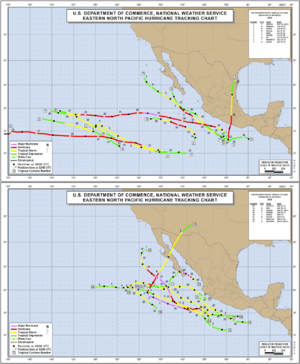1989 Pacific hurricane season facts for kids
 |
|
| Season summary map | |
| First storm formed | May 31, 1989 |
|---|---|
| Last storm dissipated | October 5, 1989 |
| Strongest storm | Raymond-935 mb – |
| 17 | |
| Total fatalities | 30+ |
| Total damage | $1.5 million (1989 USD) |
| seasons 1987, 1988, 1989, 1990, 1991 |
|
The 1989 Pacific hurricane season was a period when many powerful storms formed in the Pacific Ocean. It officially began on May 15, 1989, in the Eastern Pacific. In the Central Pacific, it started on June 1, 1989. The season ended on November 30, 1989. These dates are chosen because most tropical cyclones usually form in the northeastern Pacific Ocean during this time.
Contents
The 1989 Pacific Hurricane Season
A hurricane season is a specific time of year when tropical storms are most likely to form. These storms can grow into hurricanes. The 1989 season saw several notable storms. These storms caused damage and affected many areas.
Important Storms of 1989
Three hurricanes were especially important during this season: Cosme, Kiko, and Raymond. Each of these storms had a unique path and impact.
Hurricane Cosme's Journey
Hurricane Cosme was one of the notable storms. It traveled across Mexico. After crossing Mexico, Cosme helped create another storm. This new storm was called Tropical Storm Allison. Allison formed in the Atlantic Ocean.
Hurricane Kiko's Landfall
Hurricane Kiko was another significant storm. It made landfall on the Baja California peninsula. This happened on the side facing the Gulf of California. Landfall means the center of the storm moved over land.
Hurricane Raymond's Strength
Hurricane Raymond was the strongest storm of the 1989 season. It had very strong winds. However, Raymond became much weaker before it reached land. This weakening helped reduce its impact.
 | Dorothy Vaughan |
 | Charles Henry Turner |
 | Hildrus Poindexter |
 | Henry Cecil McBay |

